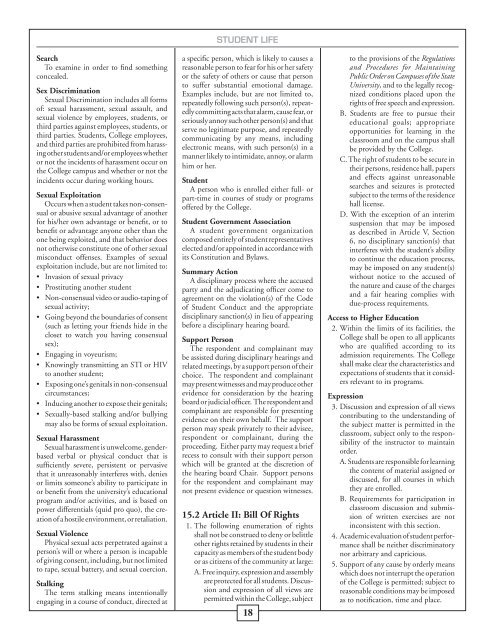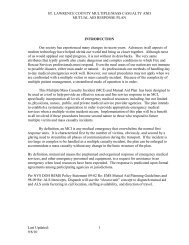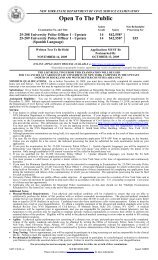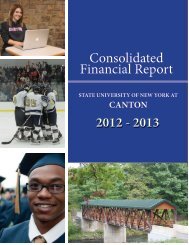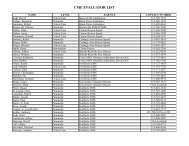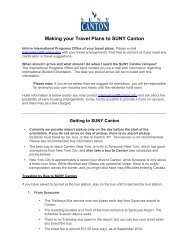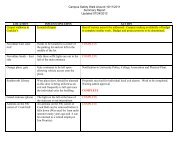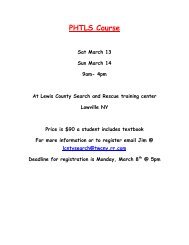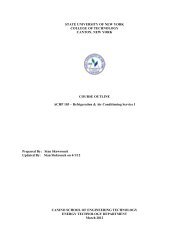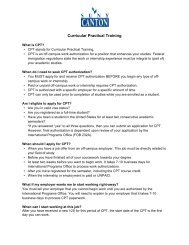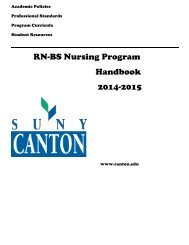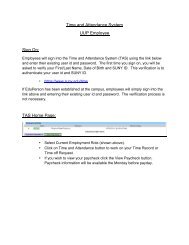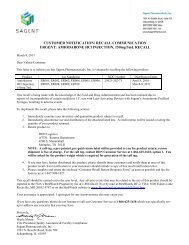Student Handbook - SUNY Canton
Student Handbook - SUNY Canton
Student Handbook - SUNY Canton
You also want an ePaper? Increase the reach of your titles
YUMPU automatically turns print PDFs into web optimized ePapers that Google loves.
Search<br />
To examine in order to find something<br />
concealed.<br />
Sex Discrimination<br />
Sexual Discrimination includes all forms<br />
of: sexual harassment, sexual assault, and<br />
sexual violence by employees, students, or<br />
third parties against employees, students, or<br />
third parties. <strong>Student</strong>s, College employees,<br />
and third parties are prohibited from harassing<br />
other students and/or employees whether<br />
or not the incidents of harassment occur on<br />
the College campus and whether or not the<br />
incidents occur during working hours.<br />
Sexual Exploitation<br />
Occurs when a student takes non-consensual<br />
or abusive sexual advantage of another<br />
for his/her own advantage or benefit, or to<br />
benefit or advantage anyone other than the<br />
one being exploited, and that behavior does<br />
not otherwise constitute one of other sexual<br />
misconduct offenses. Examples of sexual<br />
exploitation include, but are not limited to:<br />
• Invasion of sexual privacy<br />
• Prostituting another student<br />
• Non-consensual video or audio-taping of<br />
sexual activity;<br />
• Going beyond the boundaries of consent<br />
(such as letting your friends hide in the<br />
closet to watch you having consensual<br />
sex);<br />
• Engaging in voyeurism;<br />
• Knowingly transmitting an STI or HIV<br />
to another student;<br />
• Exposing one’s genitals in non-consensual<br />
circumstances;<br />
• Inducing another to expose their genitals;<br />
• Sexually-based stalking and/or bullying<br />
may also be forms of sexual exploitation.<br />
Sexual Harassment<br />
Sexual harassment is unwelcome, genderbased<br />
verbal or physical conduct that is<br />
sufficiently severe, persistent or pervasive<br />
that it unreasonably interferes with, denies<br />
or limits someone’s ability to participate in<br />
or benefit from the university’s educational<br />
program and/or activities, and is based on<br />
power differentials (quid pro quo), the creation<br />
of a hostile environment, or retaliation.<br />
Sexual Violence<br />
Physical sexual acts perpetrated against a<br />
person’s will or where a person is incapable<br />
of giving consent, including, but not limited<br />
to rape, sexual battery, and sexual coercion.<br />
Stalking<br />
The term stalking means intentionally<br />
engaging in a course of conduct, directed at<br />
STUDENT LIFE<br />
a specific person, which is likely to causes a<br />
reasonable person to fear for his or her safety<br />
or the safety of others or cause that person<br />
to suffer substantial emotional damage.<br />
Examples include, but are not limited to,<br />
repeatedly following such person(s), repeatedly<br />
committing acts that alarm, cause fear, or<br />
seriously annoy such other person(s) and that<br />
serve no legitimate purpose, and repeatedly<br />
communicating by any means, including<br />
electronic means, with such person(s) in a<br />
manner likely to intimidate, annoy, or alarm<br />
him or her.<br />
<strong>Student</strong><br />
A person who is enrolled either full- or<br />
part-time in courses of study or programs<br />
offered by the College.<br />
<strong>Student</strong> Government Association<br />
A student government organization<br />
composed entirely of student representatives<br />
elected and/or appointed in accordance with<br />
its Constitution and Bylaws.<br />
Summary Action<br />
A disciplinary process where the accused<br />
party and the adjudicating officer come to<br />
agreement on the violation(s) of the Code<br />
of <strong>Student</strong> Conduct and the appropriate<br />
disciplinary sanction(s) in lieu of appearing<br />
before a disciplinary hearing board.<br />
Support Person<br />
The respondent and complainant may<br />
be assisted during disciplinary hearings and<br />
related meetings, by a support person of their<br />
choice. The respondent and complainant<br />
may present witnesses and may produce other<br />
evidence for consideration by the hearing<br />
board or judicial officer. The respondent and<br />
complainant are responsible for presenting<br />
evidence on their own behalf. The support<br />
person may speak privately to their advisee,<br />
respondent or complainant, during the<br />
proceeding. Either party may request a brief<br />
recess to consult with their support person<br />
which will be granted at the discretion of<br />
the hearing board Chair. Support persons<br />
for the respondent and complainant may<br />
not present evidence or question witnesses.<br />
15.2 Article II: Bill Of Rights<br />
1. The following enumeration of rights<br />
shall not be construed to deny or belittle<br />
other rights retained by students in their<br />
capacity as members of the student body<br />
or as citizens of the community at large:<br />
A. Free inquiry, expression and assembly<br />
are protected for all students. Discussion<br />
and expression of all views are<br />
permitted within the College, subject<br />
18<br />
to the provisions of the Regulations<br />
and Procedures for Maintaining<br />
Public Order on Campuses of the State<br />
University, and to the legally recognized<br />
conditions placed upon the<br />
rights of free speech and expression.<br />
B. <strong>Student</strong>s are free to pursue their<br />
educational goals; appropriate<br />
opportunities for learning in the<br />
classroom and on the campus shall<br />
be provided by the College.<br />
C. The right of students to be secure in<br />
their persons, residence hall, papers<br />
and effects against unreasonable<br />
searches and seizures is protected<br />
subject to the terms of the residence<br />
hall license.<br />
D. With the exception of an interim<br />
suspension that may be imposed<br />
as described in Article V, Section<br />
6, no disciplinary sanction(s) that<br />
interferes with the student’s ability<br />
to continue the education process,<br />
may be imposed on any student(s)<br />
without notice to the accused of<br />
the nature and cause of the charges<br />
and a fair hearing complies with<br />
due-process requirements.<br />
Access to Higher Education<br />
2. Within the limits of its facilities, the<br />
College shall be open to all applicants<br />
who are qualified according to its<br />
admission requirements. The College<br />
shall make clear the characteristics and<br />
expectations of students that it considers<br />
relevant to its programs.<br />
Expression<br />
3. Discussion and expression of all views<br />
contributing to the understanding of<br />
the subject matter is permitted in the<br />
classroom, subject only to the responsibility<br />
of the instructor to maintain<br />
order.<br />
A. <strong>Student</strong>s are responsible for learning<br />
the content of material assigned or<br />
discussed, for all courses in which<br />
they are enrolled.<br />
B. Requirements for participation in<br />
classroom discussion and submission<br />
of written exercises are not<br />
inconsistent with this section.<br />
4. Academic evaluation of student performance<br />
shall be neither discriminatory<br />
nor arbitrary and capricious.<br />
5. Support of any cause by orderly means<br />
which does not interrupt the operation<br />
of the College is permitted; subject to<br />
reasonable conditions may be imposed<br />
as to notification, time and place.


